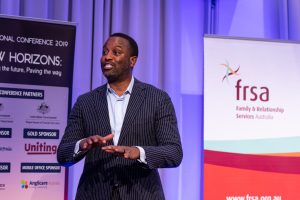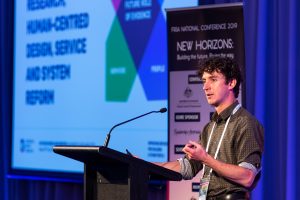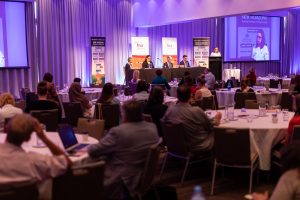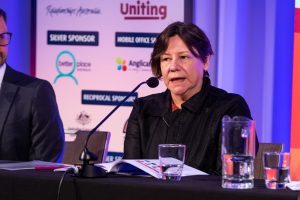Delegates were left inspired after the FRSA National Conference 2019, held for the first time in the Hunter Valley, NSW. With 400 delegates registered to attend this year’s conference, at the Crowne Plaza Hunter Valley.
This year’s FRSA Conference program was centred around the theme, New Horizons: Building the future, Paving the way, it featured a fantastic line up of international and national keynote speakers, two thought-provoking panel discussions and 70 concurrent sessions and five 90 minute symposiums in a range of streams from our brilliant mix of speakers.
 Highlights included an inspirational keynote from Dr Michael McAfee that set the tone for the rest of the conference. He shared his vision for using radical imagination to transform communities through collective impact.
Highlights included an inspirational keynote from Dr Michael McAfee that set the tone for the rest of the conference. He shared his vision for using radical imagination to transform communities through collective impact.
“We are in a moment around the world, where the magic is not going to be found in another buzzword, in more training, in another book…The question is how will you use yourself as an instrument to bring about the change you want to see in the world?” Dr Michael McAfee said.
“For me to be able to have the impact on my population, I’ve got to join with others in a different way,” he said. “If I want to do my job I’ve got to submit to the strengths of others.”
The Policylink President and CEO explained, “I’ve got to set the terms of that engagement; I’ve got to align my peers to achieve collective impact. I’ve got to be willing to measure progress, not just at my own organisation but the work we’re doing collectively.”
Delegates praised his keynote saying, “He reflected the values and reasons we are in this field. That kind of inspiration and reflection of values is essential and energizing.”
 Then it was all about data, kicking off with Dr Tim Hobbs from Dartington Service Design Lab in the UK. Fresh from running a pre-conference workshop on the Tuesday, he presented an engaging and interactive keynote on matching needs and services with data and analytics.
Then it was all about data, kicking off with Dr Tim Hobbs from Dartington Service Design Lab in the UK. Fresh from running a pre-conference workshop on the Tuesday, he presented an engaging and interactive keynote on matching needs and services with data and analytics.
“The context in which many of us are working in at the moment is that we are awash with data, there’s actually too much data. You’re asked for too much data and [it’s] typically for accountability purpose,” he said.
“If the sole purpose is accountability then what we tend to see is increased gaming of data and then people lose trust in the data,” Dr Hobbs said. “An important [and] increasing shift [is] from accountability or proving towards improving, data is most valuable if it’s data for you, if it’s data that can help you do your work better. If you can use that data to work within your teams…That’s where I think it can become very powerful.”
Barry Sandison, CEO of the Australian Institute of Health and Welfare, reiterated this in his keynote saying, “Data is only useful is there’s context”.
 Thursday’s program focus was Family Law, with a keynote presentation from the President of the Australian Law Reform Commission, Justice Sarah Derrington, where she discussed evolving families and the continuing justification for rules particular to the regulation of families.
Thursday’s program focus was Family Law, with a keynote presentation from the President of the Australian Law Reform Commission, Justice Sarah Derrington, where she discussed evolving families and the continuing justification for rules particular to the regulation of families.
“The concept of family, in contemporary Australia, takes a wide variety of forms,” Justice Derrington said. “Where children are concerned, the law must remain flexible and inventive to ensure their interests are protected.”
Justice Derrington then joined in on the following panel discussion, which asked the perennial question: ‘Finding a better Family Law System’. Chaired by FRSA Board Member, Judge Matthew Myers and featuring panellists Professor Richard Chisholm AM, Dr Nicola Ross and, Veronica Toth. Together they explored the critical issues in improving the system, for better outcomes.
Veronica Toth said, “It’s about listening to families, not just mum and dad but elders, the community and more.”
“The best interests of children, safety of children and the voice of children should be at the centre,” said Professor Richard Chisholm AM.
 With the National Framework for Protecting Australia’s Children, which was endorsed by the Council of Australian Governments in April 2009, reaches the end of its life in 2020. The final panel discussion to close the conference with Professor Daryl Higgins, Megan Mitchell, and Eliza Strapp considered how can we best ensure the safety and wellbeing of our children? What should a future national framework look like?
With the National Framework for Protecting Australia’s Children, which was endorsed by the Council of Australian Governments in April 2009, reaches the end of its life in 2020. The final panel discussion to close the conference with Professor Daryl Higgins, Megan Mitchell, and Eliza Strapp considered how can we best ensure the safety and wellbeing of our children? What should a future national framework look like?
That conversation continued with the panellists with FRSA’s first webinar on Tuesday, 17 December 2019, catch up on the webinar and watch it here.
 A networking highlight was the FRSA Conference Gala Dinner at the Conference venue with a breathtaking performance from Aboriginal dance group the Wakakulang dance group.
A networking highlight was the FRSA Conference Gala Dinner at the Conference venue with a breathtaking performance from Aboriginal dance group the Wakakulang dance group.
Evaluation surveys were sent out to all who attended the Conference. We ask if you can please spend 5 minutes in providing us some feedback, we have an opportunity to reflect upon some of the highlights of this year’s conference and to lay down the challenge for the FRSA Conference Reference Committee and the FRSA team to make next year’s conference even better.
Whether or not you attended the conference, you’ll be able to access the PowerPoint presentations via the FRSA Conference page. Keynote presentations and Panel Discussions will be uploaded to FRSA’s YouTube channel in the coming weeks.
Thank you to the sector, our delegates, our partners, sponsors and exhibitors – thank you! Without your ongoing support our Conferences would not be nearly as successful.
Watch this space for details for next year’s National FRSA Conference.





